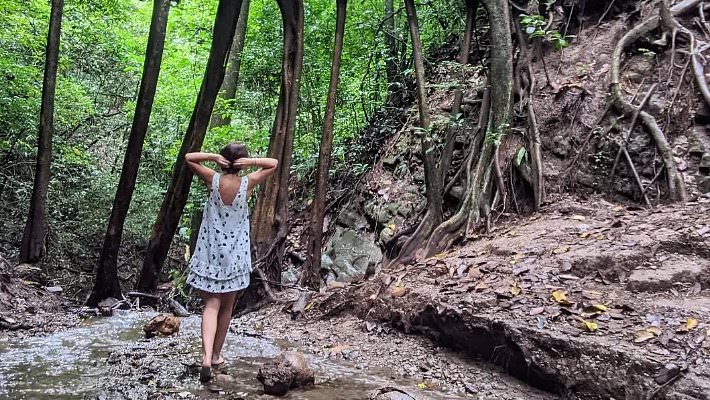A keen traveller has shared eight savvy tips for jetsetters on a budget – after revealing she visited 15 countries in a year for just £19 a day.
In 2009, Lydia Swinscoe, a freelance travel writer, initiated a personal challenge to backpack around the world for 365 days with only £7,000 in her account.
Driven by an insatiable thirst for adventure, Lydia left her office job behind and embarked on a remarkable journey where she traversed varied landscapes, sampled exotic fruits, and shared countless stories with strangers she encountered along the way.
Throughout her budget-friendly voyage spanning three continents, Lydia encountered both incredible highs and challenging lows as she explored countries like Bolivia, Malaysia, Thailand, and Brazil, creating memories that would last a lifetime.
According to the writer, travelling the globe on a budget requires a unique blend of planning, flexibility and curiousity. But how did she managed to spend just £19 a day on accommodation, travel, food and activities? Read on to find out.
Find low-cost accommodation
Dormitories may not be glamorous, but they’re gold when travelling on the bare minimum.
They’re also social, cost-effective, and frequently include perks like breakfast.

Lydia Swinscoe, who works as a travel writer, set herself the challenge of backpacking around the globe for 365 days with just £7,000 in her account (Pictured: Lydia in Medellín, Colombia)

For those craving a bit more privacy, slow travel via Airbnb or homestays can be both comfortable and budget-friendly, especially for longer stays (pictured: Napoli, Italy)
According to Lydia, a night’s stay in places like Peru or Bolivia can be as cheap as £5.
For those craving a bit more privacy, slow travel via Airbnb or homestays can be both comfortable and budget-friendly, especially for longer stays.
Lydia added: ‘When travelling on £20 a day, dormitories provide not only the ability to share stories and tips with fellow adventurers but are economically essential.’
Travel slowly and go off-radar
According to Lydia, rigid itineraries are the enemy of budget travel, as she said: ‘I rarely have a rigid plan before heading off into the unknown, and this is handy when trying to keep spending to a minimum.’
Being flexible allows for better deals and longer stays in low-cost regions such as India, Bolivia, Peru and Cambodia.
She added: ‘Without taking advantage of social and economic issues, many countries well-known for offering a more low-key way of life are also less expensive, and it’s these countries I would recommend exploring when a budget is to be adhered to.’
Countries such as India offer rich culture and activities – such as festivals, temples and swimmable lakes – for a fraction of the cost, and staying longer in one place often deepens your experience and slashes daily expenses.

Being flexible allows for better deals and longer stays in low-cost regions such as India, Colombia, Guatemala, Georgia and Peru (Pictured: Lydia in the Mexican highlands)
Embrace local cuisine – and cook it too
Skip the tourist-trap restaurants and hit local markets and bazaars for fresh, exotic ingredients you won’t find at home.
Not only is it cheaper to cook your own meals, but it’s a culinary adventure in itself, according to Lydia.
She said: ‘I go crazy over Peru’s sour camu camu berries, Bolivia’s huge avocados and Colombia’s cacao nibs, cashew apples and rare trumpet mushrooms.’
In Asia, you can feast on street food like Bangkok’s legendary £2 Pad Thai alongside a bottle of ice-cold Chang, all while soaking in the atmosphere under neon lights and plastic chairs.

Skip the tourist-trap restaurants and hit local markets and bazaars for fresh, exotic ingredients you won’t find at home (Pictured: Lydia’s meal in Bangkok, Thailand)
Choose ground travel over air
Flying may be fast, but it’s costly – both for your wallet and the planet.
Buses, trains, and boats are not only more economical but offer a front-row seat to the heart of a country.
Long-haul journeys also bring unexpected beauty, from remote villages to dramatic landscapes, and can even double as accommodation if you opt for a sleeper service.

Long-haul journeys often bring unexpected beauty, from remote villages to dramatic landscapes (Pictured: Thesprotia, Greece)
Explore on foot
Exploring on foot is free and often the most rewarding way to discover a new city.
Taxis drain funds fast, while walking keeps you fit, frugal, and far more connected to your surroundings – especially if you’re lugging a 16kg backpack to your next lodging on the way.
Public transport like metro systems or bicycles are also budget-friendly alternatives that help you live more like a local.

Exploring on foot is free and often the most rewarding way to discover a new destination (Pictured: The St. Regis Maldives Vommuli Resort)
Sleep while you travel
According to Lydia, overnight buses and trains kill two birds with one stone – saving on accommodation while moving between destinations.
While they’re no luxury ride, sleeper journeys in countries like India, Laos, or Bolivia are ‘once-in-a-lifetimes experiences’ that are full of character and memorable views.
Lydia advised: ‘Earplugs, face masks, and snacks are optional but highly recommended.’

While they’re no luxury ride, sleeper journeys in countries like India, Laos, or Bolivia are ‘once-in-a-lifetimes experiences’ that are full of character and memorable views (pictured: Annapurna base camp, Nepal)
Take a city tour
Many cities offer free (tip-based) one-to-two hour walking tours hosted by knowledgeable locals.
These tours are perfect for picking up history, insider recommendations, and cultural insights.
From Santiago’s bustling food scene to Sofia’s deep-dive into its Communist past, these walks are wallet-friendly and enlightening.

Many cities offer free (tip-based) one-to-two hour walking tours hosted by knowledgeable locals (Pictured: Napoli, Italy)
Say yes to friendly strangers
The real magic of travel often lies in the people you meet, said Lydia.
Fellow travellers are an ‘overflowing fountain of travel expertise’ – and occasionally, hospitality.
Staying open to new friendships has led to some of the writer’s most meaningful and budget-saving experiences, from shared meals to spontaneous homestays.

















